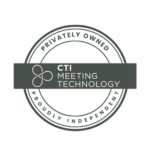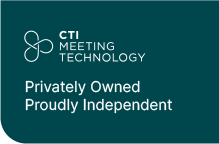The events industry is an ever-changing landscape. Just think about how conferences used to be before the rise of technology and the pandemic. Technology evolves, audiences’ expectations change, and new trends emerge every year. Organizers need to constantly innovate and adapt to avoid falling behind.
Where We Stand
Currently, event organizers have access to a variety of tools and platforms that streamline planning and enhance attendee experiences. However, the fast technological advancements and new trends suggest even bigger changes coming. But no worries, we got you!
Change can be scary but also exciting. We don’t have a crystal ball, but we used our experience and expertise to gather the trends and key elements that we believe will play a big part in scientific meetings next year. So, what can we expect from the events industry in 2025?
1. Integration of AI
Artificial Intelligence has been a buzzword for the past two years, with the appearance of Chat GPT and new AI-powered tools emerging almost every week. Every industry, including events, has been leveraging these tools to simplify their processes.
AI helps organizers save time and automate tasks, so it’s not surprise that this trend is here to stay. A few months ago, we wrote an article on how to use Chat GPT prompts to help organize events, but here are some other ways in which AI can simplify organizers’ jobs:
- Using chatbots to answer questions: Have you ever counted how many times participants asked the same question during a meeting? Even if it’s easy to answer, it requires time and available staff to monitor and give a prompt response to each question. Organizers can use chatbots to answer simple questions and redirect users to the right places.
- Personalizing the attendee experience: By analyzing navigation data, AI can recommend similar sessions and curate an enjoyable agenda for attendees. One-size-fits-all solutions don’t cut it anymore. Attendees want to feel heard and ensure their time is well-spent by attending your meeting. In 2025, event success will largely depend on customizable user journeys.
- Promoting inclusivity: Most international conferences use English as the common language. Offer automatic translations for non-English speakers and captions for those hearing-impaired participants.
- Identifying trends: AI-tools analyze event data to identify relevant trends and patterns, helping organizers make data-driven decisions.
- Elevating networking: AI algorithms can analyze attendees’ profiles and match them with similar participants, making networking more personal and enjoyable.
2. Enhanced Hybrid Event Capabilities
If there’s another trend that has been going on for a while now and doesn’t seem to go down anytime soon is hybrid events. In fact, 70% of events are now hybrid, according to a report from Skift Meetings. The mix of in-person and virtual capabilities offers attendees the best of both worlds, which is why this format is so popular.
That means an increasing demand for seamless integration between virtual platforms and in-person experiences. Event software can implement AI tools to facilitate content navigation. For example, creating bookmarks and allowing users to search for certain terms in abstracts and videos.
Polls and live Q&A functionalities also facilitate engagement and connect virtual attendees with those present in person. AI-powered tools gather the results obtained and help to create comprehensible reports.
Choose a software provider that can seamlessly integrate onsite and virtual environments for a successful meeting experience.
3. Bigger Focus on Sustainability
As the overall concern for sustainability grows, we cannot forget about the impact that large conferences have in the environment. Organizers need to step up their game and implement sustainable options to reduce the impact of onsite meetings.
No need to change the whole planning process, small changes can make a big difference! Organizers can implement paperless solutions, relying on mobile apps and digital signage to minimize waste. Other options include offering eco-friendly catering options and adding a virtual component to reduce travelling. It’s a win-win situation: organizers can reduce their carbon footprint while enhancing their brand reputation.
4. Blockchain for Security and Transparency
While technology offers many benefits, it also introduces new challenges and security threats. The amount of data and research being shared in a scientific meeting is huge and needs to have a robust security system in place. Blockchain technology can bring a new level of security and transparency to the events industry, ensuring secure payments and transparent operations.
5. Enhanced Data Privacy and Compliance
Following the topic of security, individuals are now more aware of their rights and how their data can be shared. Event management software will place a greater emphasis on compliance and user content management.
Now more than ever, organizers need to be transparent about data collection and offer clear opt-in choices. In the same way, allow users to quickly opt-out if they want to. Don’t worry too much about it! Building trust among participants and clearly communicating data management practices is essential for a successful meeting experience.
6. Augmented Reality for In-Person Meetings
Organizers are always looking for creative ways to engage participants. Augmented Reality (AR) can play a big part in enhancing in-person events. Just imagine walking through a venue where AR elements bring the conference to life, including interactive maps or ePosters. It’s for sure an experience that attendees won’t forget easily!
The downside to this type of technology is the high cost. But when used right, it can be utilized for venue marketing and bring extra revenue to your meeting. You and your team just need to get a bit creative to align AR to your organization’s goals.
Here you can read some real examples for inspiration.
7. Predictive Analytics
As the events industry rapidly changes, organizers need to rely on predictive analytics to stay ahead and make data-driven decisions. Event technology can leverage data from past events and provide insights into likely outcomes. Here’s when using a single software provider for the whole meeting lifecycle can come in handy. The more data you have, the more accurate the results. This data helps organizers allocate their resources more effectively and focus on the activities that increase attendee satisfaction.
8. Multi-Channel Communication and Engagement
Audiences are changing, and also the way to communicate with them. Moving forward, organizers need to shift toward a multi-channel strategy, leveraging multiple platforms to engage with attendees. We are all online, but the way Gen X and Gen Z use the Internet are completely different.
Your team should now start researching and choosing the channels that will be used to communicate with attendees before, during and after the meeting. Furthermore, tracking engagement across these channels will offer valuable insights into interests and behaviors, which can help to shift strategies if needed. A lot of it is trial and error, so don’t be afraid to try new approaches! If you need a bit of inspiration, read our article on how to use social media to promote your event.
—
Wrapping Up…
As we’ve explored, some trends in the events industry have been long-standing, while others, like AI, are more recent and require deeper research. It is up to you as an organizer to choose which trends to hop on and which ones are not a priority. We hope at least now you have a clear picture of what 2025 will bring to your meetings!
How To Stay Ahead of the Curve Using Event Technology
The need to have an all-in-one software solution is becoming more and more imperative. Which is why event management software providers are constantly working on integrations and updates to cover the entire meeting lifecycle in one platform.
To stay ahead of the curve, event organizers should not only embrace the challenges posed, but have a reliable partner to help them navigate the complex meeting environment. Looking for a 360º robust event management software? Check out our features and solutions.





